非谓语动词----分词讲解及练习课件
文档属性
| 名称 | 非谓语动词----分词讲解及练习课件 |

|
|
| 格式 | zip | ||
| 文件大小 | 153.5KB | ||
| 资源类型 | 教案 | ||
| 版本资源 | 牛津译林版 | ||
| 科目 | 英语 | ||
| 更新时间 | 2013-12-17 22:10:10 | ||
图片预览

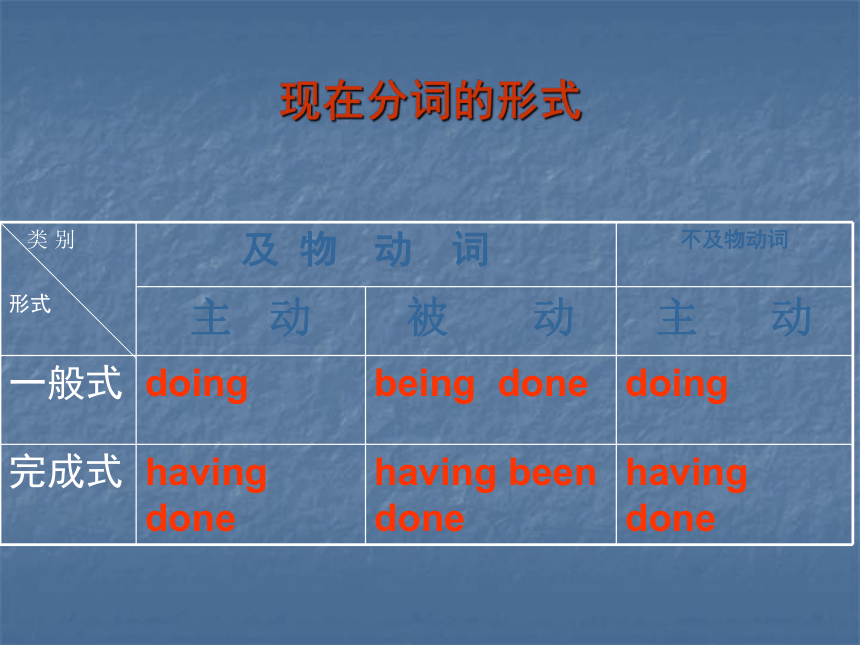
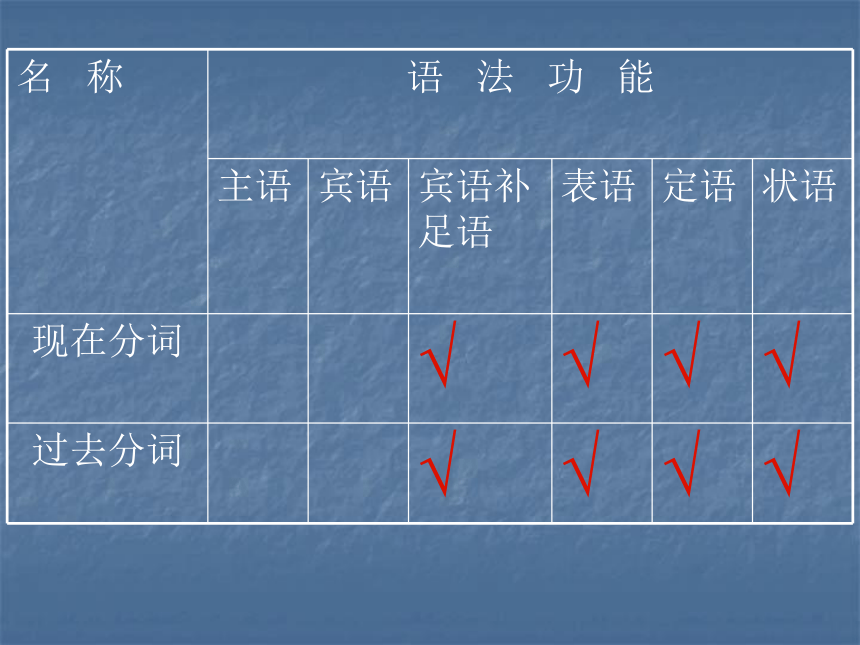


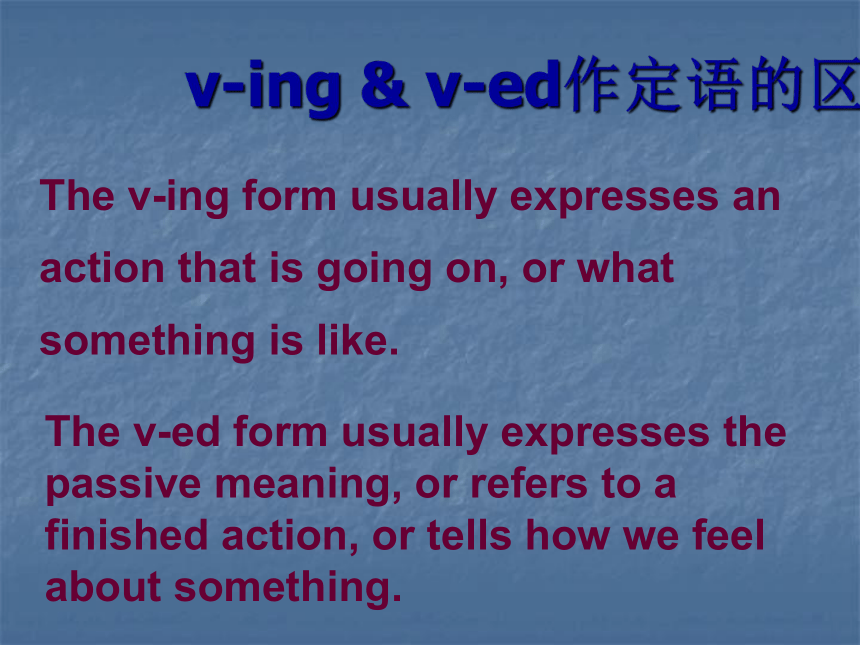
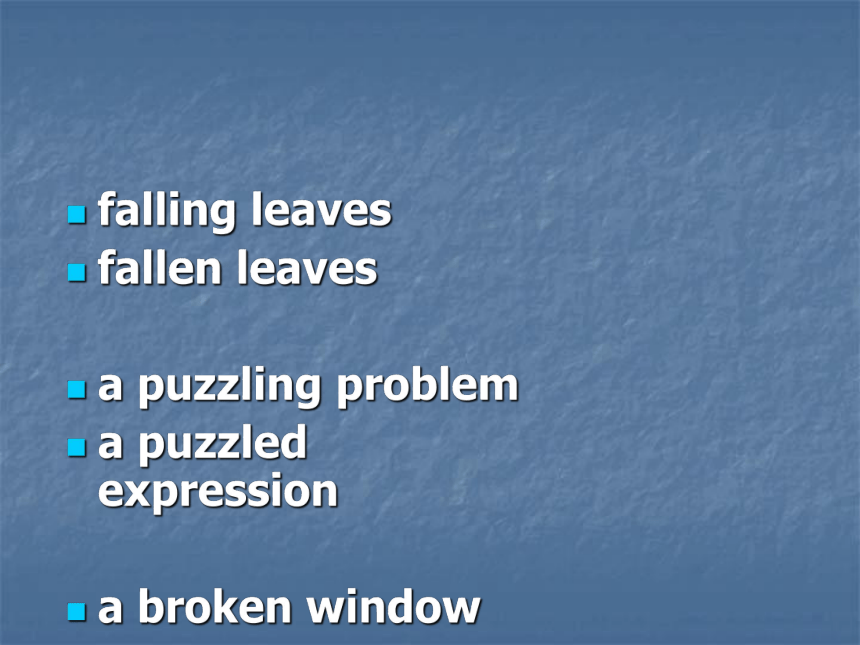
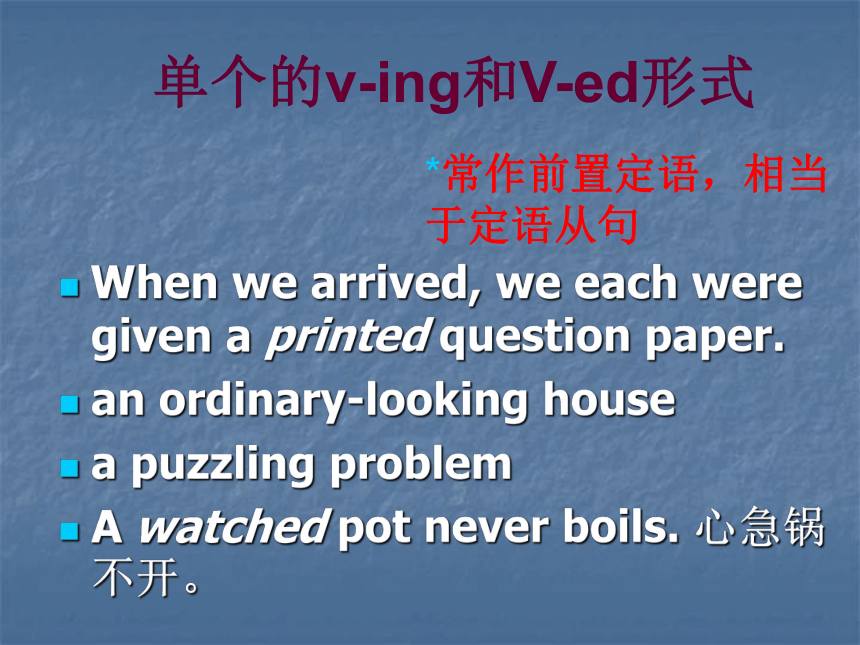
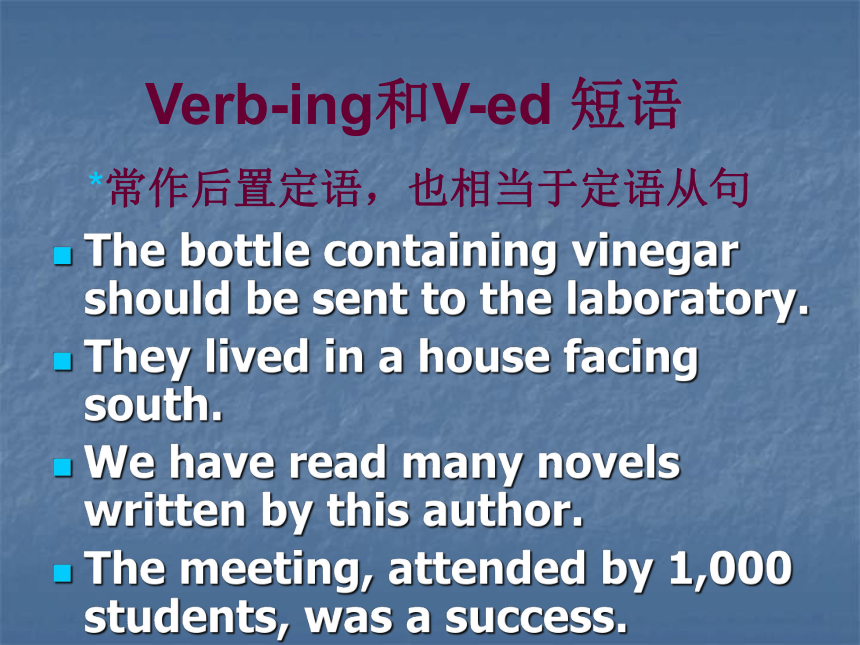

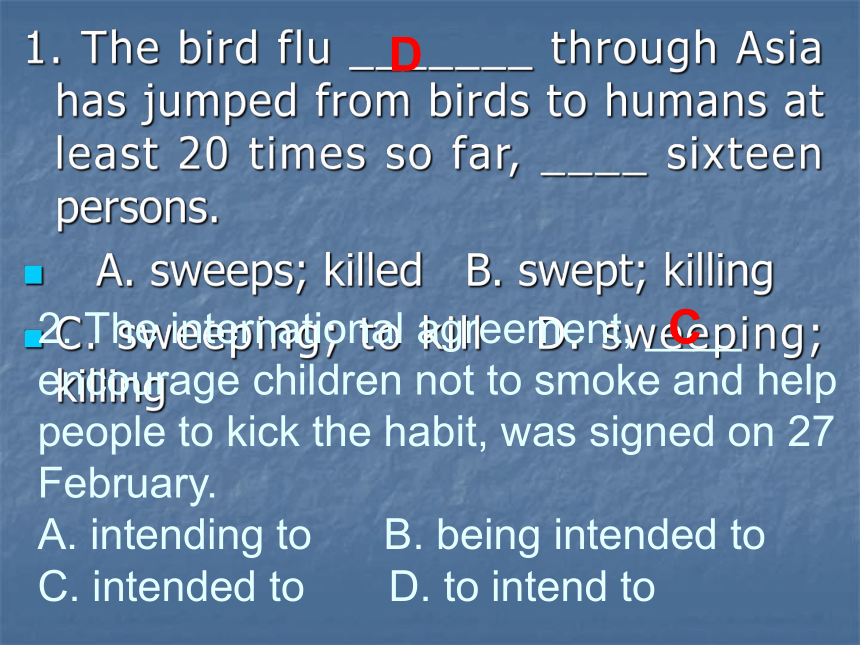
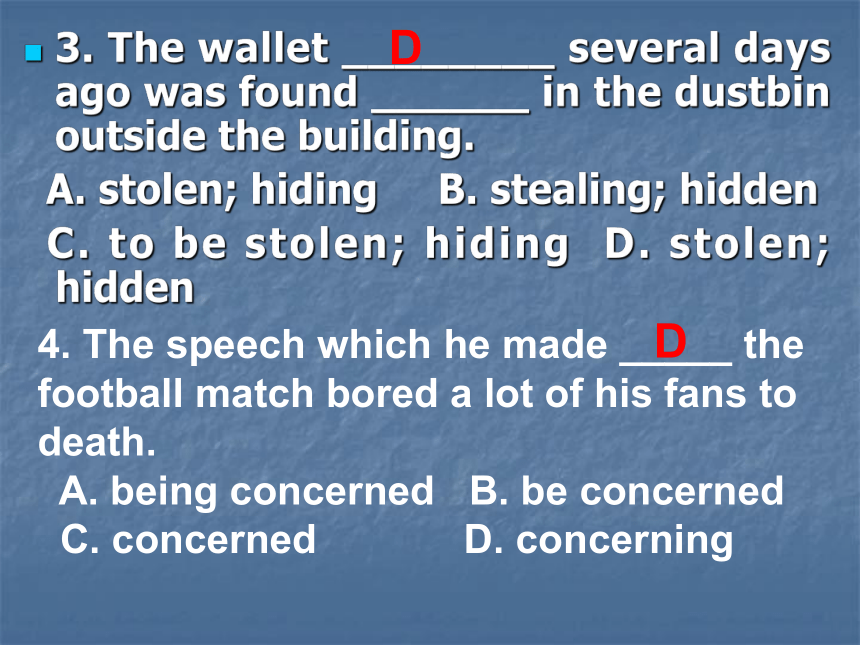
文档简介
课件30张PPT。非谓语动词----分词
present participle & past participle现在分词的形式Watching the exciting football match, they were very excited.
The football match is very exciting.Seeing from the mountain, we can see our beautiful school.
Seen from the mountain, our school looks more beautiful.an interesting story;
a surprised lookWe hear the girl singing a song in the house.
We often hear the song sung by the girl.Verb-ing & verb-ed Function as adjectives (attribute)
Function as adverbs (adverbial)v-ing & v-ed作定语的区别 The v-ing form usually expresses an
action that is going on, or what
something is like.The v-ed form usually expresses the
passive meaning, or refers to a finished action, or tells how we feel about something.
falling leaves?
fallen leaves?
a puzzling problem
a puzzled expression
a broken window
When we arrived, we each were given a printed question paper.
an ordinary-looking house
a puzzling problem
A watched pot never boils. 心急锅不开。
*常作前置定语,相当于定语从句单个的v-ing和V-ed形式The bottle containing vinegar should be sent to the laboratory.
They lived in a house facing south.
We have read many novels written by this author.
The meeting, attended by 1,000 students, was a success.
*常作后置定语,也相当于定语从句Verb-ing和V-ed 短语
v-ing形式的完成式一般不作定语。
被地震毁坏的庙宇很快就要重建了。
【误】The temple having been destroyed by the earthquake will be rebuilt soon.
【正】The temple which has been destroyed by the earthquake will be rebuilt soon.
注意:1. The bird flu _______ through Asia has jumped from birds to humans at least 20 times so far, ____ sixteen persons.
A. sweeps; killed B. swept; killing
C. sweeping; to kill D. sweeping; killing
2. The international agreement, ____ encourage children not to smoke and help people to kick the habit, was signed on 27 February.
A. intending to B. being intended to
C. intended to D. to intend to DC3. The wallet ________ several days ago was found ______ in the dustbin outside the building.
A. stolen; hiding B. stealing; hidden
C. to be stolen; hiding D. stolen; hidden4. The speech which he made _____ the football match bored a lot of his fans to death.
A. being concerned B. be concerned
C. concerned D. concerningDD5. Lessons_______ easily are soon forgotten.
A.? learned B. to be learned
C. learning D. learn AV-ing和V-ed形式作状语动词-ing和V-ed形式可以作状语,修饰动词, 在句中表示时间、原因、结果、条件、让步、行为方式或伴随情况等。
动词-ing形式其动作执行者与句子主语是主动一致,但V-ed形式其动作执行者与句子主语是被动一致。Seeing from the mountain, we can see our beautiful school.
Seen from the mountain, our school looks more beautiful1 表示时间,相当于一个时间状语从句。Examples:2 表示原因,相当于一个原因状语从句。
Being ill, he didn't go to school yesterday.Moved by the heroic deeds, the children
couldn't help crying.3 表示条件,相当于一个条件状语从句。
Heated, water changes into steam.
Working hard at your lessons, you will succeed.4 表示让步,相当于一个though/although引导的让步状语从句。
Exhausted by the running, they went on running after the robber.5 作状语表示行为方式、伴随情况或补充说
明时,通常位于句子的后面,相当于一个并
列分句。The teacher came in, followed by students.
The teacher came in, following the headmaster.6 表示结果,相当于一个并列谓语。
His father died, leaving him a lot of money.注意:Unless invited, he will not come back to
the company. Even if invited, I won't go. When driving to the airport, he knocked
down a person. Three special types of V-ing formsbeing +v-ed, having +v-ed ,
having been + v-ed Having lived in this city for three years,
she knows it very well.
Having seen the situation, a wealthy
American businessman, Charles Yerkes,
tried to improve the system.
The underground system being built in the city will be open next year.
The underground system built last year will be open next year.
The underground system having been built for three years will be open next
year.The negative word not always appears before the v-ing or v-edNot knowing which line to take, she turned to me for help.1. A computer virus hit the U.SDepartment
of State, ____the performance of the
government information technology system.
A. affecting B. affected C. to affect D. to be affected
2. ______ quick profits from trees, people cut them down in large numbers, ______ that they have lost their good friends.
A. To get; to find B. Getting; finding
C. To get; only to find D. Getting; to be finding
DC3. Upon ______ home, he made a telephone call to me.
A.he arrived B. arrived
C. arriving D. to arrive
4. _______ a little money, Jimmy was able to buy his mother a lovely new lamp.
A. Having saved B. To save
C. Saving D. saved
CA5. He sat on the platform, ________ to answer the question.
A.prepare B. preparing
C. prepared D. to prepare
6._______ with such difficulty, Jack felt at a loss what to say.
A.? Faced B. Being faced
C. Facing D. To faceAB7.The long-lasting meeting ended in failure, _________ no agreement.
A. to reach B. would reach
C. reaching D. reached
8.The student corrected his paper carefully, ______ the professor’s suggestions.
A. follow B. following
C. followed D. being followedCB9. ________ in the bustling city, he asked a policeman for help.
A. Lost B. Having lost
C. Losing D. Lose
10. After a few rounds of talks, both sides regarded the territory dispute _______.
A. being settled B. to be settled
C. had settled D. as settledAB独立主格结构a.Having finished his work, he went home
in a hurry.
b.The moon appearing, we decided to spend
the night at the foot of mountain.Having done his work, he went to bed.
b.His work having been done, he went to
bed.
1. Tom looked at Jenny, tears ______ his eyes, and shouted the words _____ in his heart for years.
A.filling; having been hidden
B.filled;hidden
C. filling; hidden
D. filled; hidden
2. ________ Sunday, we stayed at home.
A. It being B. Being
C. It was D. Because being AA
4. Without more coal _______ the fire, it would soon go out.
A. adding B. added to C. adding to C. added up to
3. With winter ______ on, it’s time to buy warm clothes.
A. comes B. coming
C. will come D. came
BB5. I have two elder brothers, _______ in the army for ten years.
A. the elder of whom
B. the older having served
C. the older of which
D. the elder one has served
6.Silver is the best conductor of electricity, copper ________ it closely.
A. followed B. to follow
C. following D. being followed BC
The football match is very exciting.Seeing from the mountain, we can see our beautiful school.
Seen from the mountain, our school looks more beautiful.an interesting story;
a surprised lookWe hear the girl singing a song in the house.
We often hear the song sung by the girl.Verb-ing & verb-ed Function as adjectives (attribute)
Function as adverbs (adverbial)v-ing & v-ed作定语的区别 The v-ing form usually expresses an
action that is going on, or what
something is like.The v-ed form usually expresses the
passive meaning, or refers to a finished action, or tells how we feel about something.
falling leaves?
fallen leaves?
a puzzling problem
a puzzled expression
a broken window
When we arrived, we each were given a printed question paper.
an ordinary-looking house
a puzzling problem
A watched pot never boils. 心急锅不开。
*常作前置定语,相当于定语从句单个的v-ing和V-ed形式The bottle containing vinegar should be sent to the laboratory.
They lived in a house facing south.
We have read many novels written by this author.
The meeting, attended by 1,000 students, was a success.
*常作后置定语,也相当于定语从句Verb-ing和V-ed 短语
v-ing形式的完成式一般不作定语。
被地震毁坏的庙宇很快就要重建了。
【误】The temple having been destroyed by the earthquake will be rebuilt soon.
【正】The temple which has been destroyed by the earthquake will be rebuilt soon.
注意:1. The bird flu _______ through Asia has jumped from birds to humans at least 20 times so far, ____ sixteen persons.
A. sweeps; killed B. swept; killing
C. sweeping; to kill D. sweeping; killing
2. The international agreement, ____ encourage children not to smoke and help people to kick the habit, was signed on 27 February.
A. intending to B. being intended to
C. intended to D. to intend to DC3. The wallet ________ several days ago was found ______ in the dustbin outside the building.
A. stolen; hiding B. stealing; hidden
C. to be stolen; hiding D. stolen; hidden4. The speech which he made _____ the football match bored a lot of his fans to death.
A. being concerned B. be concerned
C. concerned D. concerningDD5. Lessons_______ easily are soon forgotten.
A.? learned B. to be learned
C. learning D. learn AV-ing和V-ed形式作状语动词-ing和V-ed形式可以作状语,修饰动词, 在句中表示时间、原因、结果、条件、让步、行为方式或伴随情况等。
动词-ing形式其动作执行者与句子主语是主动一致,但V-ed形式其动作执行者与句子主语是被动一致。Seeing from the mountain, we can see our beautiful school.
Seen from the mountain, our school looks more beautiful1 表示时间,相当于一个时间状语从句。Examples:2 表示原因,相当于一个原因状语从句。
Being ill, he didn't go to school yesterday.Moved by the heroic deeds, the children
couldn't help crying.3 表示条件,相当于一个条件状语从句。
Heated, water changes into steam.
Working hard at your lessons, you will succeed.4 表示让步,相当于一个though/although引导的让步状语从句。
Exhausted by the running, they went on running after the robber.5 作状语表示行为方式、伴随情况或补充说
明时,通常位于句子的后面,相当于一个并
列分句。The teacher came in, followed by students.
The teacher came in, following the headmaster.6 表示结果,相当于一个并列谓语。
His father died, leaving him a lot of money.注意:Unless invited, he will not come back to
the company. Even if invited, I won't go. When driving to the airport, he knocked
down a person. Three special types of V-ing formsbeing +v-ed, having +v-ed ,
having been + v-ed Having lived in this city for three years,
she knows it very well.
Having seen the situation, a wealthy
American businessman, Charles Yerkes,
tried to improve the system.
The underground system being built in the city will be open next year.
The underground system built last year will be open next year.
The underground system having been built for three years will be open next
year.The negative word not always appears before the v-ing or v-edNot knowing which line to take, she turned to me for help.1. A computer virus hit the U.SDepartment
of State, ____the performance of the
government information technology system.
A. affecting B. affected C. to affect D. to be affected
2. ______ quick profits from trees, people cut them down in large numbers, ______ that they have lost their good friends.
A. To get; to find B. Getting; finding
C. To get; only to find D. Getting; to be finding
DC3. Upon ______ home, he made a telephone call to me.
A.he arrived B. arrived
C. arriving D. to arrive
4. _______ a little money, Jimmy was able to buy his mother a lovely new lamp.
A. Having saved B. To save
C. Saving D. saved
CA5. He sat on the platform, ________ to answer the question.
A.prepare B. preparing
C. prepared D. to prepare
6._______ with such difficulty, Jack felt at a loss what to say.
A.? Faced B. Being faced
C. Facing D. To faceAB7.The long-lasting meeting ended in failure, _________ no agreement.
A. to reach B. would reach
C. reaching D. reached
8.The student corrected his paper carefully, ______ the professor’s suggestions.
A. follow B. following
C. followed D. being followedCB9. ________ in the bustling city, he asked a policeman for help.
A. Lost B. Having lost
C. Losing D. Lose
10. After a few rounds of talks, both sides regarded the territory dispute _______.
A. being settled B. to be settled
C. had settled D. as settledAB独立主格结构a.Having finished his work, he went home
in a hurry.
b.The moon appearing, we decided to spend
the night at the foot of mountain.Having done his work, he went to bed.
b.His work having been done, he went to
bed.
1. Tom looked at Jenny, tears ______ his eyes, and shouted the words _____ in his heart for years.
A.filling; having been hidden
B.filled;hidden
C. filling; hidden
D. filled; hidden
2. ________ Sunday, we stayed at home.
A. It being B. Being
C. It was D. Because being AA
4. Without more coal _______ the fire, it would soon go out.
A. adding B. added to C. adding to C. added up to
3. With winter ______ on, it’s time to buy warm clothes.
A. comes B. coming
C. will come D. came
BB5. I have two elder brothers, _______ in the army for ten years.
A. the elder of whom
B. the older having served
C. the older of which
D. the elder one has served
6.Silver is the best conductor of electricity, copper ________ it closely.
A. followed B. to follow
C. following D. being followed BC
同课章节目录
- 名词
- 动词/动词短语
- 一般现在时及其被动式
- 一般过去时及其被动式
- 现在进行时及其被动式
- 过去进行时及其被动式
- 将来进行时及其被动式
- 现在完成时及其被动式
- 过去完成时及其被动式
- 一般将来时及其被动式
- 过去将来时及其被动式
- 现在完成进行时及其被动式
- 将来完成时及其被动式
- 副词
- 介词/介词短语
- 连词/连接词
- 数词/量词
- 冠词
- 形容词
- 非谓语动词
- 句型
- 简单句与并列句
- 复合句
- 主谓一致
- 倒装与省略
- 强调句
- 虚拟语气
- 插入语
- 固定句型
- 祈使句/感叹句
- 疑问句/反义疑问句
- 非限制性定语从句
- 句型转换
- 定语从句
- 表语从句
- 宾语从句
- 主语从句
- 动词时态与语态
- 虚拟语气与情态动词
- 主谓一致
- 独立主格结构、with的复合结构
- 情态动词
- 状语从句
- 定语从句
- 特殊句式
- 交际用语
- 代词/不定代词
- 名词性从句
- 同位语从句
- 表语从句
- 宾语从句
- 主语从句
- 直接引语和间接引语
- 构词法(word formation)
